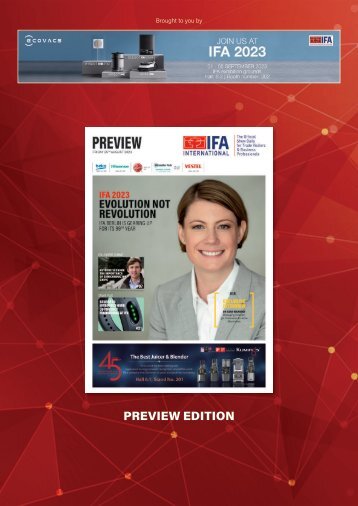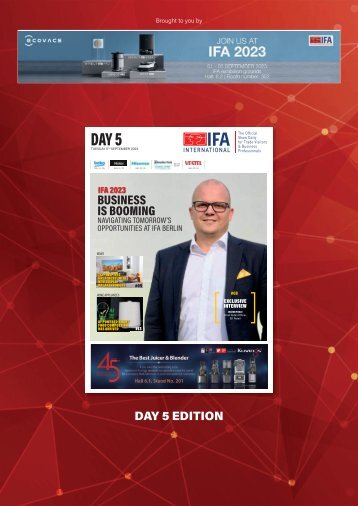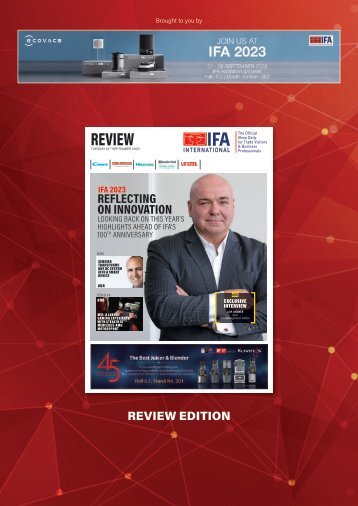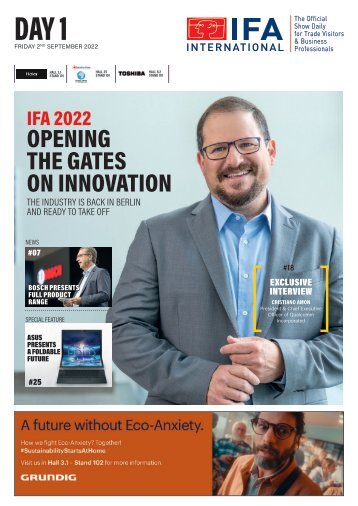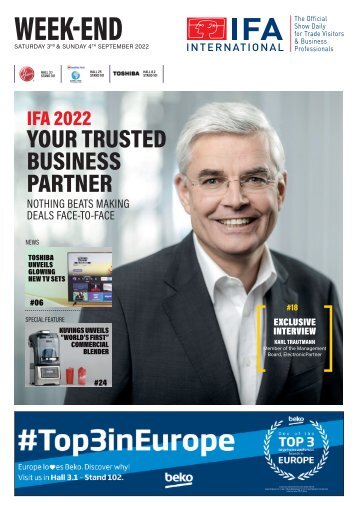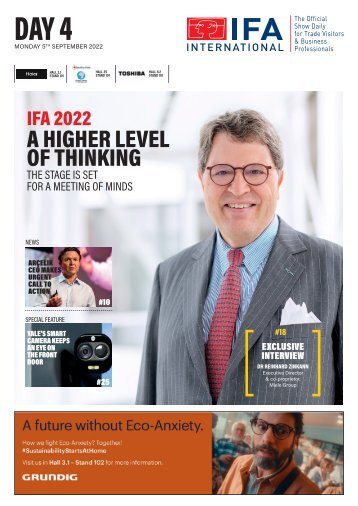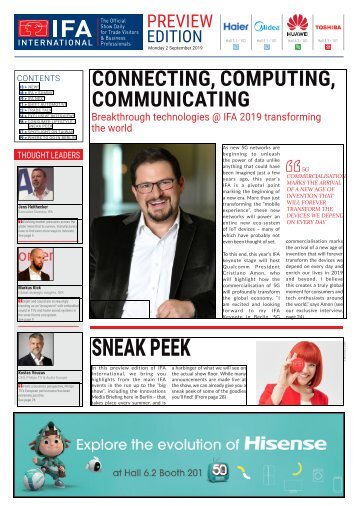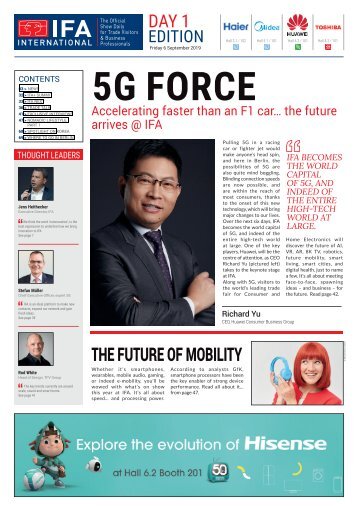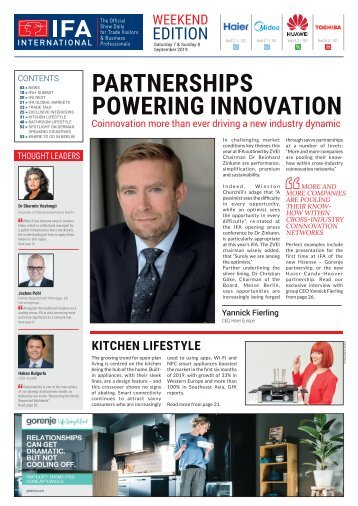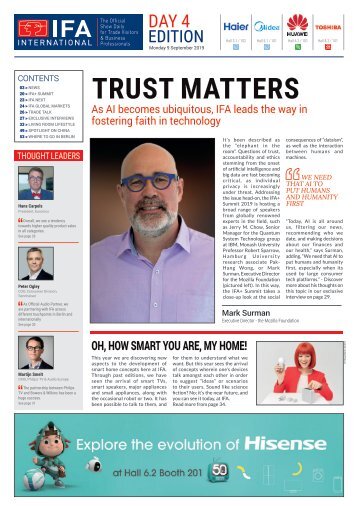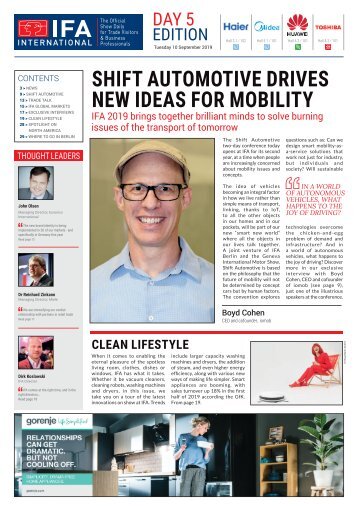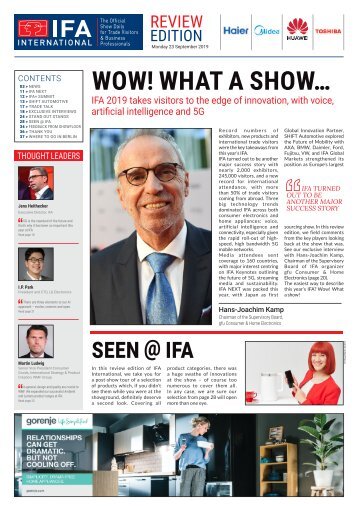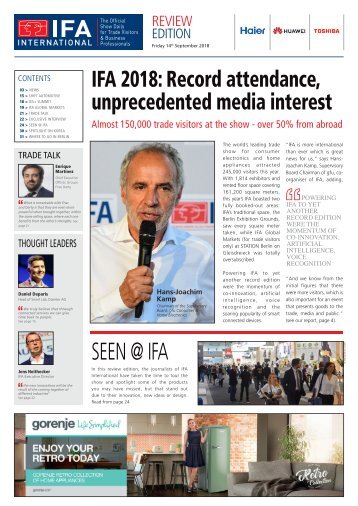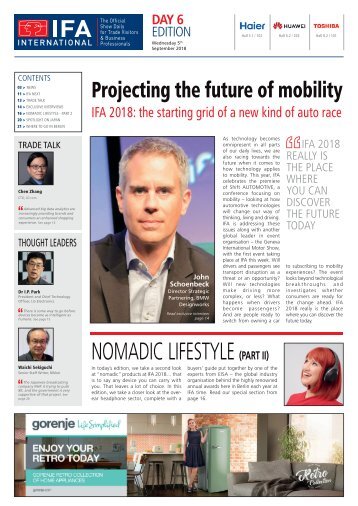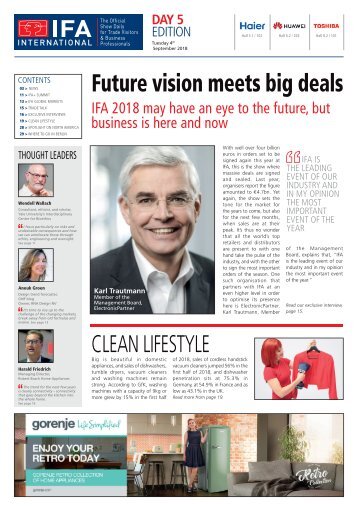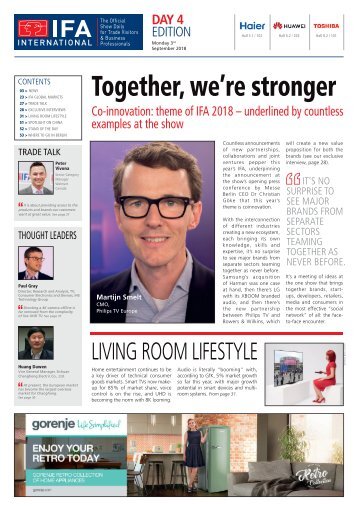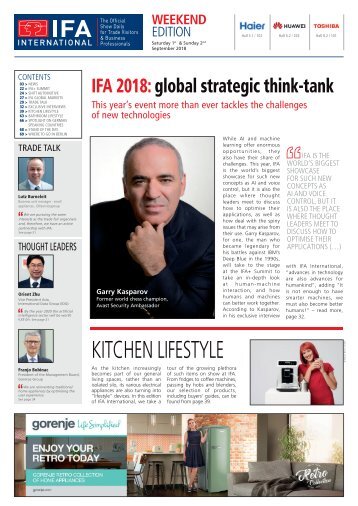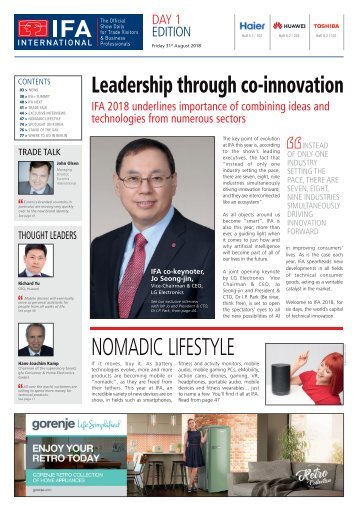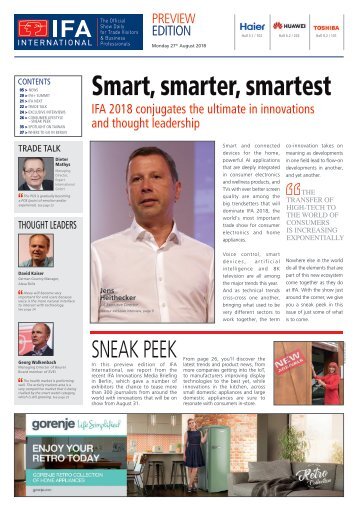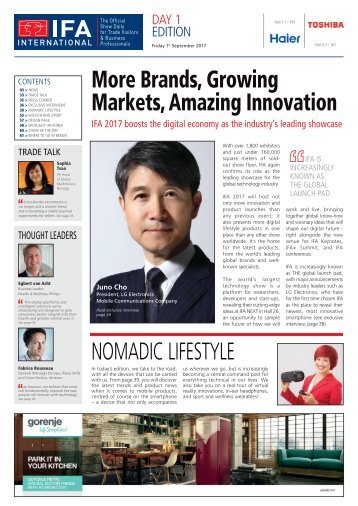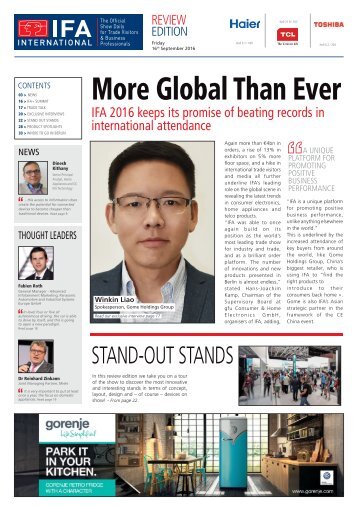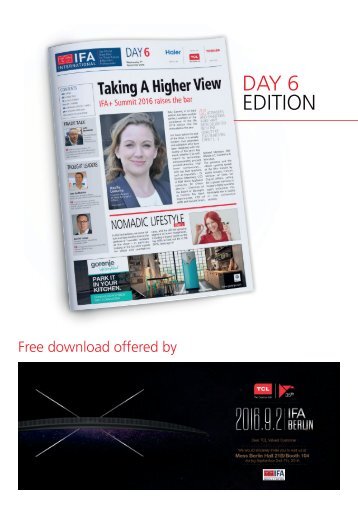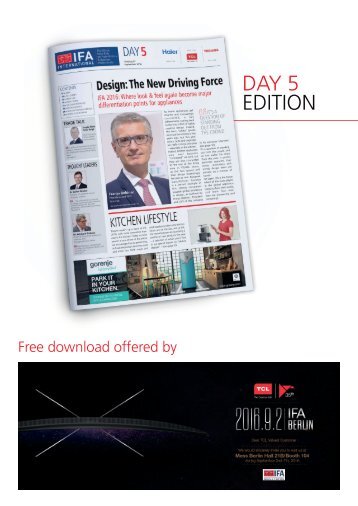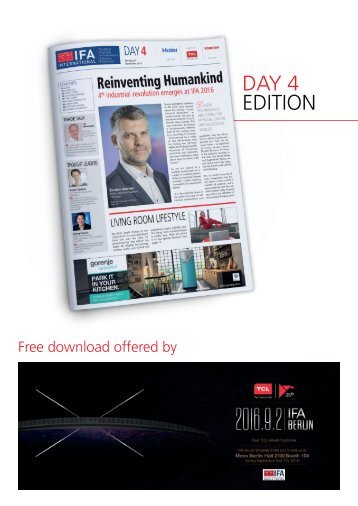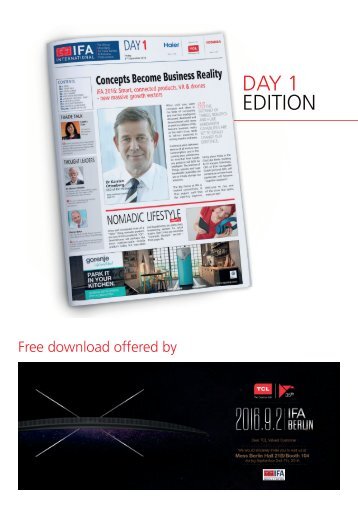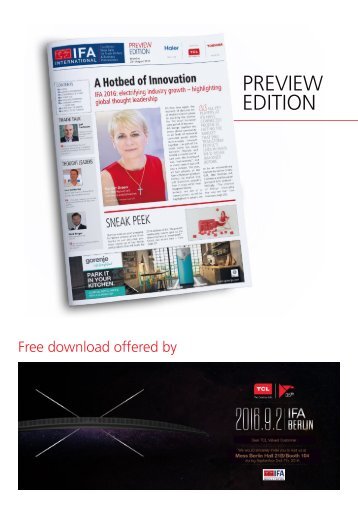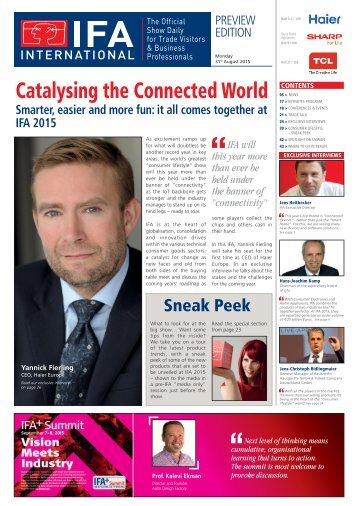
Day 1 - IFA International
- Text
- Tablet
- Products
- Berlin
- Mobile
- Appliances
- Consumer
- September
- Consumers
- Digital
- Devices
- Www.cleverdis.com
ADVERTORIAL Hisense
ADVERTORIAL Hisense works towards a smarter world A game-changing smart TV that will propel China into the TV superleague is the first step in Hisense Group’s smart strategy, which was launched three months ago by company Chairman Zhou Houjian. Called I’TV, Hisense’s personalised solution is described by Zhou as a “micro innovation that is set to create a major revolution” in the world of entertainment. Its most distinctive features include ‘big screen to small screen’, whereby any cable-TV programme can be instantly transmitted to an I’TV or smartphone; ‘small screen to big screen’, which allows any video programme, including HD programming accessed via I’TV online, to be instantly transmitted to the I’TV; and ‘remote screen’, which enables any TV programme received at home to be viewed from a remote location. In short, I’TV is an entertainment revolution in a box. Thanks to embedded software applications, including intelligent recommendation and social networking, it can segue from console to PC to socialising tool, redefining both the experience of watching television and the evolution of the TV set. The development of a personalised smart TV in a short period of time required intense collaboration across Hisense’s corporate ecosystem. To achieve this, ‘technology clusters’ were created, based on a combination of system software, cloud computing, internet applications, artificial intelligence, industrial design and operational services. The introduction of the cloud platform is also challenging the concept of traditional TV by enabling upgrades in functionality, such as personalised intelligent remote control. Zhou hopes that the I’TV will act as a catalyst for China’s colour TV manufacturers, who “have hit a wall” in terms of product and marketing innovation. “The industry needs to reinvent itself in order to create new sources of revenue,” he adds. “Our timely launch of the I’TV marks a turning point for smart television.” But the result promises to transform the colour-TV industry. The functionality of the TV terminal has been vastly expanded, allowing consumers to view programming through any device with a screen. “The concept that television is watched on a TV set will gradually fade,” Zhou says. 20
The Year of the Tablet Tablet Sales Forecast Remains Strong Robust market despite first quarter being below expectations First quarter worldwide media tablet s h i p m e n t s into sales channels were 7.2 million units, according to the Inter national Data Corporation (IDC) Worldwide Quarterly Media Tablet and eReader Tracker. Looking forward, however, IDC raised its shipment forecast for 2011 to 53.5m units from a previous projection of 50.4m units. Mobile phone vendors, such as Samsung and Motorola, found moderate success with their media tablets, but sales were largely thwarted by many consumers' unwillingness to sign up for the 3G/4G data plans that the carriers typically require along with these devices. As an operating system, Android-based devices grew to 34% of the total, a share increase of 8.2 points over the previous quarter. "Like the PC market, media tablets had a bit of a challenging quarter in Q1, as concerns about general macro-economic issues and the post-holiday letdown took a toll on demand," said Bob O'Donnell, IDC Vice President, Clients and Displays. "We expect the rest of the year to be much stronger, but we believe that vendors who continue to focus on the mobile network operators channel for distribution, will face serious challenges." Even though tablet sales have not lived up to expectations, many industry observers a re q u e s t i o n i n g the viability of the e-reader market’s s u s t a i n a b i l i t y . E-readers still offer the truest reading e x p e r i e n c e a n d appeal most to avid readers, but a broader market of consumers a r e d e m a n d i n g m u l t i m e d i a functionality, such as web browsing, video and gaming, in their next mobile device. “Of the two, the tablet market is the stronger and more sustainable o p p o r t u n i t y, ” s a y s Stephanie Ethier, Senior Analyst at In-Stat. “In fact, e-reader manufacturers will soon begin adding tabletlike devices to their line-ups in order to take advantage of the tablet frenzy. Barnes & Noble already offers the Color Nook, which is often compared to a tablet, and Amazon, the leader in the e-reader space with its Kindle, will likely launch a tablet device later this year in an effort to compete head-to-head with the iPad.” But another fastdeveloping technology may well give the tablet market a boost. After decades of false starts, 3D is finally becoming a mainstream feature through gaming and video content. Not only will this have an impact on traditional home CE devices, but mobile devices as well, including handheld game Media tablets, conclude the analysts, deliver a richer experience around content consumption, thanks to the ecosystem they support. consoles, smartphones, and tablets. This, in turn, will drive demand for image sensors — a key technology component for 3D — growing that market sector over 130% by 2015, according to In-Stat. “The image sensor segment stands to gain the most from the use of 3D technology in mobile devices, because unlike the processor or the display, true 3D requires at least two image sensors, one for each imaging solution,” says Jim McGregor, Chief Technology Strategist at In-Stat. “That means four image sensors, two frontfacing and two rear-facing, are required for a full 3D experience. Several mobile devices with four image sensors have already been introduced and many more are slated for introduction throughout 2011 and 2012.” Another recent survey disputes the idea that media tablets are killing the netbook market, and that both device types are “cannibalising” sales of laptops. The results of a survey of 1,142 consumers conducted by ABI Research in March 2011, reveal that netbooks and media tablets are actually equal in terms of consumer interest. Purchases of these companion devices are likely to result in a prolonged PC lifecycle and delay replacement. But according to ABI’s Mobile Devices Group Director Jeff Orr, “Nearly half of those surveyed, however, report that they are either ‘not very’ or ‘not at all’ interested in purchasing a media tablet. The most common response for the lack of interest is ‘I don’t see the need’, selected by 60% of this group." In another recent survey, Gartner claims that Apple’s iOS will dominate the media tablet market through 2015, owning more than half of that market for the next three years. Due to the success of Apple’s iPad, iOS will account for 69% of media tablet OSs in 2011, and represent 47% of the media tablet market in 2015. Gartner analysts say that the Apple iPad did to the tablet PC market what the iPhone did to the smartphone market: re-invented it. Media tablets, conclude the analysts, deliver a richer experience around content consumption, thanks to the ecosystem they support. “Seeing the response from both consumers and enterprises to the iPad, many vendors are trying to compete by first delivering on hardware and then trying to leverage the platform ecosystem,” said Carolina Milanesi, Research Vice President at Gartner. “Many, however, are making the same mistake that was made in the first response wave to the iPhone, as they are prioritising hardware features over applications, services and overall user experience. Tablets will be much more dependent on the latter than smartphones have been, and the sooner vendors realise that, the better chance they have to compete head-to-head with Apple.” Keep taking the tablets A little more than half of people surveyed by IDC believe that the primary use for the media tablet will be entertainment. In line with this result, entertainmentrelated applications are the ones that most people report they would likely use on the media tablet: • 82% intend to use email • 71% expect to use a web browser • 57% plan to watch TV or download movies • 56% intend to use social networking • 55% plan to play games www.ifa-international.org IFA International • Friday 2 nd September 2011 21
- Page 1: DAY 1 edition international O f f i
- Page 4 and 5: News Driving The Market World’s p
- Page 7: News Tablets Mark Sony's Comeback F
- Page 11: News Beko Debuts Home Appliances Le
- Page 14 and 15: Market & Technology Trends The Ever
- Page 16 and 17: Visionary Interview MASAAKI OSUMI M
- Page 18 and 19: made in Europe Regional Spotlight M
- Page 23: The Year of the Tablet YOUNGHEE LEE
- Page 28 and 29: The Year of the Tablet Been There,
- Page 30 and 31: Hall 12 - Stand 103 Hall 3.2 - Stan
- Page 33: Notebooks & Netbooks IFA 2011 Inter
- Page 37: The IFA eLibrary e-Reading At Any A
- Page 41: Refrigeration Technologies Modular
- Page 44 and 45: 40
- Page 46 and 47: Trade News we can identify as the m
- Page 48 and 49: HOTELS / RESTAURANTS / BARS Where t
- Page 50: Where to goin berlin WelcomeCard -
Inappropriate
Loading...
Mail this publication
Loading...
Embed
Loading...

IFA International
- IFA International 2023
- IFA International 2022
- IFA International 2020
- IFA International 2019
- IFA International 2018
- IFA International 2017
- IFA International 2016
- IFA International 2015
- IFA International 2014
- IFA International 2013
- IFA International 2012
- IFA International 2011
- IFA International 2010
- IFA International 2009
- IFA International 2008
- IFA International 2007
